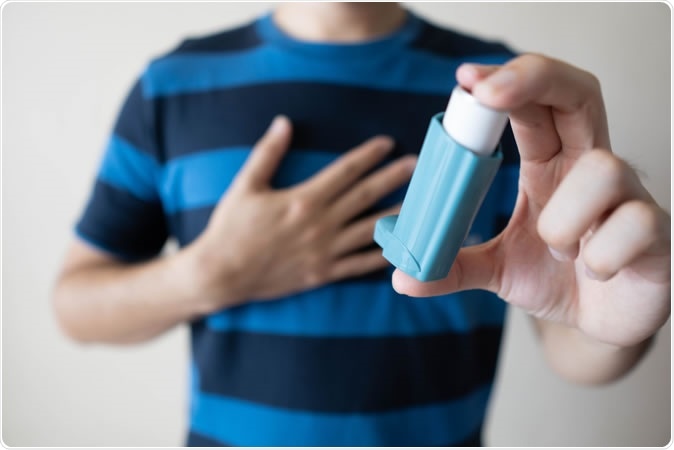
Lead author of the study, Johann Christian Virchow, from Rostock Medical University in Germany said, “This will have an impact on patients. For the first time, we've shown that triple therapy is effective with one inhaler.” He added, “We know that even when you use the two-drug combination in high doses, we have patients whose asthma remains uncontrolled.” He explained that the addition to the combination is especially beneficial for those with bronchoconstriction by reducing exacerbations of asthma.
The team conducted two double blind randomized phase 3 trials.
These were called;
- Triple in Asthma With Uncontrolled Patients on Medium Strength of ICS + LABA (TRIMARAN) and
- Triple in Asthma High Strength Versus ICS/LABA HS and Tiotropium (TRIGGER)
In both the trials the three-drug inhaler was compared to standard medium dose and high dose two drug regimen.
Participants
- For the studies, the researchers included 2,592 (aged between 18 and 75 years) of which 61 percent (1,579) were females.
- The participants were from 171 study sites from 16 different countries for TRIMARAN and 221 sites and 17 different countries for TRIGGER
- They recorded that among the participants 20 percent or 514 had had at least one episode of asthma exacerbation in the past 12 months.
- The participants had all been diagnosed before the age of 40 years and had a baseline prebronchodilator forced expiratory volume in 1 second (FEV₁) below 80 percent
- They had Asthma Control Questionnaire score of at least 1.5.
Design
- In TRIMARAN – Patients were assigned to two inhalations twice daily from a single inhaler for 52 weeks. The inhalers contained ICS (beclometasone dipropionate 100 μg) and LABA (formoterol fumarate 6 μg). Half of the inhalers also contained long-acting muscarinic antagonist glycopyrronium 10 μg
- In TRIGGER – Patients were randomly assigned two inhalations twice daily for 52 weeks. One of the groups received one inhaler containing ICS (beclometasone 200 μg) and LABA (formoterol 6 μg) in one of them and another inhaler with glycopyrronium 10 μg. The other group received beclometasone 200 μg plus formoterol 6 μg in one inhaler and tiotropium 2.5 μg from another inhaler.
Results
- In TRIMARAN trial - Predose FEV₁ measured was 57 mL higher when three drug combination was used compared to two drug regimen. The reduction rate of moderate to severe exacerbations was 15 percent more with three drugs compared to two drugs.
- In TRIGGER trial - Predose FEV₁ measured was 73 mL higher when three drug combination was used compared to two drug regimen with tiotropium. The reduction rate of moderate to severe exacerbations was 15 percent more with three drugs compared to two drugs.
Virchow explained the results saying, “Those with severe exacerbations got the most benefit.” Virchow added, “The results are statistically significant but not extremely impressive. Remember that if you have normal lung function, your room for improvement is very small.”
Analysis of both trials in a pooled manner showed that time till a person experienced a moderate or severe exacerbation of asthma was longer with a single inhaler containing beclometasone, formoterol, and glycopyrronium compared to an inhaler containing the two-drug combination of beclometasone and formoterol.
Use of a triple drug single inhaler versus two inhalers
He added that putting three drugs in one inhaler was better that using the three drugs in two different inhalers. He explained, “There are good data showing that more inhalers mean more errors in usage.” He added that first of the problems is, “One is a mist that requires the user to inhale very slowly and deeply,” while the other is a powder that needs more forceful inspiration. Further the muscarinic antagonist may take up to three quarters of an hour to work and thus may be skipped by many patients when given separately. Overall adherence to therapy declined he said adding, “You can imagine all the scenarios. We expect that patients in the real world needing triple therapy will have better adherence with a single inhaler.”FitzGerald, MD, from Vancouver General Hospital, in Canada, who was part of both the trials wrote in a linked comment, “We must continue to emphasize the importance of asthma education and inhaler technique and adherence for all patients with asthma. We need to continue to improve characterization of the heterogeneous nature of airway diseases and in parallel employ targeted treatments for the right patient at the appropriate time.” He explained, “Forty percent of patients on a combination therapy remain uncontrolled, with excessive exposure to systemic prednisone. Before you go to a biologic, for about three-quarters of these patients, a triple therapy is the best most cost-effective choice.” He added, “And the fact that they're using one inhaler simplifies it for the patient and the physician.”
The study was funded by Chiesi Farmaceutici. Co-author Sandrine Corre from Chiesi Farmaceutici in Italy said, “Since the preventive treatment we trialled delivers three drugs via one inhaler and given the reduction we saw in the annual rate of severe asthma attacks, we expect it will provide an attractive option helping to fulfil an unmet need for both individuals and health systems.”
Journal reference:
Single inhaler extrafine triple therapy in uncontrolled asthma (TRIMARAN and TRIGGER): two double-blind, parallel-group, randomised, controlled phase 3 trials, Virchow, Johann Christian et al. https://www.thelancet.com/journals/lancet/article/PIIS0140-6736(19)32215-9/fulltext






No comments
Post a Comment